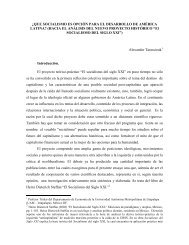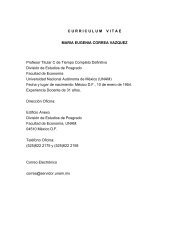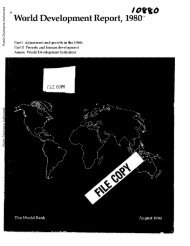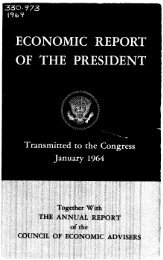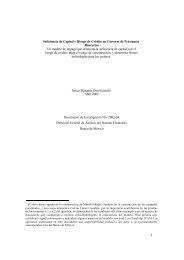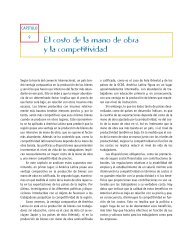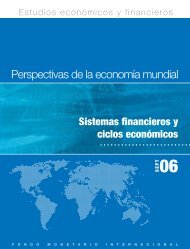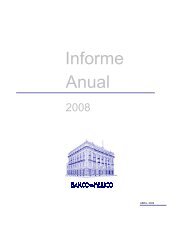World Bank Document
World Bank Document
World Bank Document
Create successful ePaper yourself
Turn your PDF publications into a flip-book with our unique Google optimized e-Paper software.
expected to be high-a view consistent with high<br />
Figure 3.4 Government expenditures as a iong-term interest rates at the moment.<br />
percentage of national income in Europe,<br />
g<br />
the United States, and Japan, 1965-84<br />
To bring real interest rates down for more than a<br />
short period, a credible change in fiscal policy in<br />
Percent<br />
the United States therefore seems desirable. The<br />
60 high dollar exchange rate has stimulated exports to<br />
the United States and has therefore increased pro-<br />
50 duction in other countries. Avoiding any recesuro<br />
sionary impact of such a policy change will require<br />
40 Europ nited States careful coordination with monetary policy in the<br />
United States and also with monetary and fiscal<br />
30 policies in other industrial countries. However,<br />
Japan<br />
failing such a policy change, high real interest rates<br />
20 and a continued high exchange value of the dollar<br />
would eventually tend to reduce growth in indus-<br />
10 trial countries and continue to divert world savings<br />
1965 1970 1975 1980 1984 away from developing countries. Moreover, sus-<br />
Source: OECD National Accounts; national sources. tained trade imbalances and exchange rate misalignments<br />
will lead to increased protectionist<br />
pressure in industrial countries. In those circumstances,<br />
developing countries would find it<br />
importing developing countries and industrial increasingly difficult to increase export earnings<br />
countries other than the United States (see Figure and service their debts.<br />
3.5).<br />
Between 1979 and 1984, the U.S. inflation- Protectionism<br />
adjusted budget deficit (see Box 3.3) deteriorated<br />
by $162 billion, a shift that was far greater than, for Increased protectionism in industrial countries<br />
example, the $70 billion current account deteriora- against developing countries' exports reduces the<br />
tion of oil-exporting countries over the same export earnings that developing countries would<br />
period. To put this in perspective, total gross world otherwise obtain. That is detrimental to their<br />
savings in 1979 is estimated at $2,060 billion. The capacity to import and to service their debt. It<br />
$162 billion increase therefore represents 8 percent therefore is a threat to efficient economic growth<br />
of world savings in 1979. Budget shifts of this size and to a satisfactory solution of the debt problems<br />
can explain a significant part of the increase in real many developing countries face.<br />
interest rates. Fiscal deficits can also explain the In aggregate, exports from oil-importing develupward<br />
tilt in the term structure of interest rates. oping countries have in fact grown faster than<br />
Since the U.S. budget deficit is expected to remain world trade in general since 1974 (in volume<br />
high, future short-term interest rates are also terms). With less protectionism they would have<br />
Table 3.2 Inflation-adjusted government budget balance as a percentage of national income in selected<br />
industrial countries, 1965-84<br />
Nine large<br />
industrial countries<br />
United United Including Excluding<br />
Year Kingdom Germany Italy France Japan States United States United States<br />
1965-73 3.8 1.0 -3.6 1.8 1.8 1.6 1.5 1.4<br />
1974-78 2.7 -2.4 0.3 0.5 2.4 1.0 0.1 -0.6<br />
1979 2.1 -1.9 -0.7 0.8 -4.4 3.6 0.7 -1.3<br />
1980 3.4 -2.1 4.5 2.2 -3.6 2.0 0.7 -0.2<br />
1981 2.2 -2.5 2.0 0.5 -3.3 2.4 0.6 -0.8<br />
1982 1.5 -1.9 -0.3 -0.4 -2.8 -2.0 -1.6 -1.3<br />
1983 -1.1 -1.7 -0.4 -1.5 -3.4 -3.0 -2.7 -2.4<br />
1984 -0.3 -0.4 -4.7 -1.9 -1.7 -2.7 -2.3 -1.9<br />
Note: Negative sign indicates deficit.<br />
Source: OECD National Accounts; national sources.<br />
37




